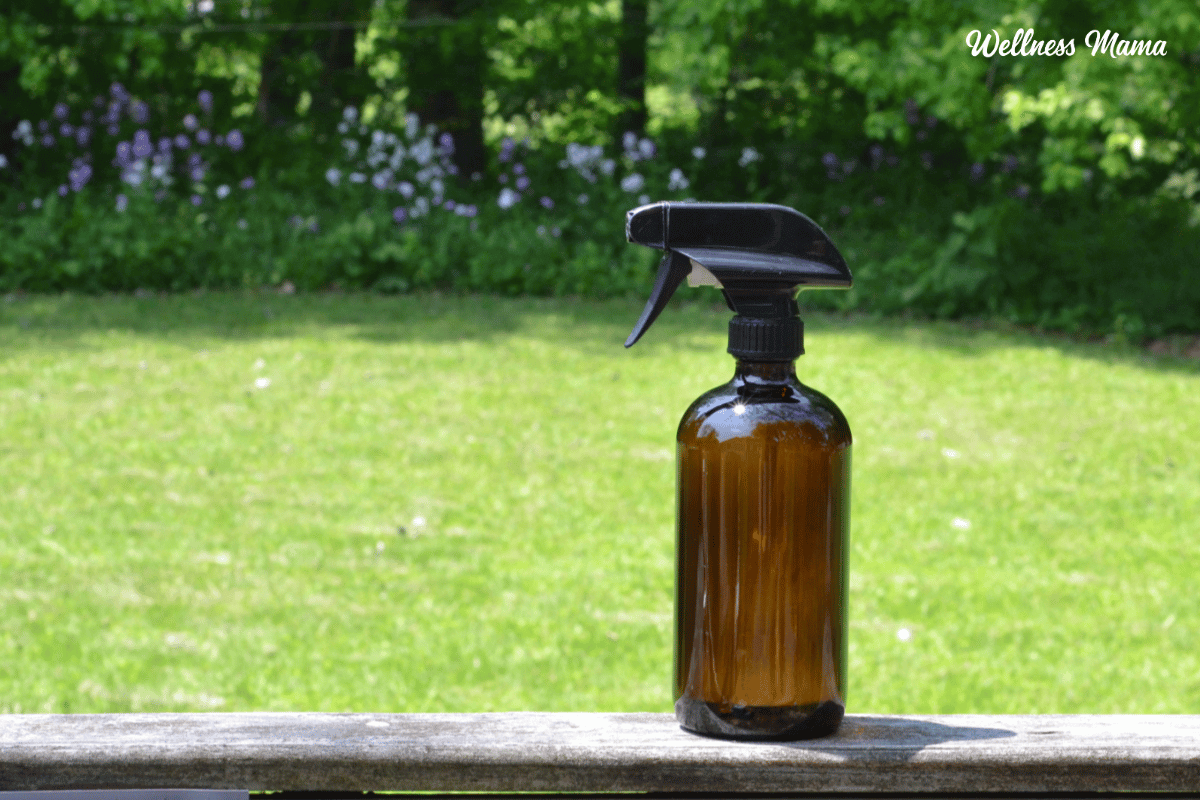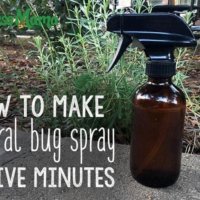Every year as warmer weather approaches, I make several homemade products for summer. This includes my homemade sunscreen and these natural bug repellent recipes.
I don’t use sunscreen often because it limits vitamin D production. I prefer to eat my sunscreen instead. This homemade insect repellent spray recipe, on the other hand, gets daily use where we live (unfortunately!).
Why Homemade Bug Spray?
At my house, we joke about mosquitoes being the size of birds. They certainly do seem to come in flocks! Keeping bugs away with a good mosquito repellent is a top priority, especially with small children who are prone to scratching mosquito bites.
It’s not just annoying bites that we have to worry about. Some mosquitos can transmit diseases like Zika and West Nile virus. Then there are fleas and ticks infected with Lyme disease, Bartonella, and more.
According to the CDC, about 6% of all mosquito types are known to transmit diseases. But it’s impossible to know which ones when you’re just enjoying an evening outside.
Many natural bug-repellent options from the store aren’t my first option either. The label may say all natural and plant-based but they’re full of soybean oil and undisclosed proprietary ingredients. For example, one popular brand of DEET-free natural mosquito repellent features oil of lemon eucalyptus. However, the other 70% of the ingredients list is a mystery.
What’s the Deal with DEET?
While I am serious about avoiding bug bites, I don’t want to use nasty pesticides and repellents like DEET to do it. DEET is in many commercial insect repellents and has mixed results when it comes to safety.
The EPA weighed in on DEET in 1998 and again in 2014, concluding it doesn’t have health concerns for most people, even for kids. Looking at their long list of warnings and precautions, I’ll stick with my natural bug spray.
Dr. Aboue Donia, a pharmacologist found that rats treated with an average human dose of DEET had some issues. They performed far worse than control rats on physical tasks requiring muscle control, strength, and coordination.
In the same study, DEET caused neurons to die in parts of the brain that control muscles, learning, memory, and concentration. Young children are more at risk because their skin absorbs things more readily.
It’s also interesting to note that so far the EPA has yet to complete an endocrine disruptor screening on DEET. So we don’t know know how it affects hormones.
Another common pest control option is picaridin, a synthetic chemical derived from piperine. Runoff from these products contaminates the water supply and is known to cause deformities in certain animals. So what is it doing to us?
Natural Alternatives to DEET
As with most household items, you can make natural bug spray cheaply and naturally at home. Lotion with coconut oil is another DIY I like to make instead of buy. This recipe takes just minutes to mix up. You can use different ingredients based on what you have available. I’ve included several variations so you can try whichever one you have the ingredients for.
5-Minute Essential Oil Natural Bug Repellent
This is the best bug spray recipe I’ve found. It uses essential oils, which are really effective for natural bug protection. I prefer not to put this blend directly on skin, especially on kids. Instead, I use it on clothing or our gear.
Any combination of these essential oils will work:
- Citronella oil
- Cedarwood oil
- Clove oil
- Lemongrass oil
- Rosemary oil
- Tea tree oil
- Cajeput oil
- Catnip oil
- Geranium oil
- Lavender oil
- Peppermint oil
All of the above have insect and mosquito-repelling properties. I’ve included the mixture I use below. For this recipe, I use 100 drops of essential oil in total with a mixture of various oils. If you don’t have a certain oil you can leave it out or use a mixture of the others in its place.
Don’t Want to DIY Your Natural Bug Repellent?
Don’t feel like making your own? There are some really great pre-made bug-repellant options now.
To save time, I sometimes use a pre-mixed kid-safe essential oil blend. It’s made to repel insects and can replace the other oils in the recipe below. Here are a few premade natural bug spray options that don’t require any mixing at all.
- Revive Bugs Away Outdoor Spray
- Badger Anti-Bug Shake and Spray
- Babyganics Natural Insect Repellent Wipes
- Herbal Armor
I definitely recommend spot-testing for allergic reactions anytime you’re using a new product on your skin, whether it’s natural or not.
Natural Bug Repellent Recipes
I use this bug spray to spray my kid’s clothing on their way out the back door in the summer. I also pack one in our first aid kit when camping or hiking. This homemade anti-itch cream is also handy to carry in case of a random bug bite!
Natural Bug Repellent Recipe
Equipment
Materials
- 30 drops geranium essential oil
- 30 drops citronella essential oil
- 20 drops lemon eucalyptus essential oil
- 20 drops lavender essential oil
- 10 drops rosemary essential oil
- 1 TBSP vodka (or rubbing alcohol)
- ½ cup witch hazel
- 1 tsp vegetable glycerin (optional)
- ½ cup water (or vinegar)
Instructions
- In a glass spray bottle, combine the essential oils.
- Add the vodka or rubbing alcohol and shake well to combine.
- Pour in the witch hazel and shake again to combine.
- Add the vegetable glycerin if using. It isn’t necessary, but it does help everything stay combined.
- Add the water and shake again.
- Shake before each use as the oils and water will naturally separate over time.
Notes
I keep a bottle of this bug spray by the back door for easy application. I also pack one in our first aid kit when camping or hiking. I find it’s also handy to carry this homemade anti-itch cream in case of the random bug bite!
DIY Bug Repellent Recipe Variations
Natural bug sprays can also be made without essential oils. Just use dried herbs and witch hazel or vinegar. This recipe is less expensive, but it’s not as potent as the recipe above.
Herbal Bug Spray Ingredients
- 1 cup distilled water
- 1 cup witch hazel or 190 proof alcohol
- 1 TBSP peppermint or spearmint
- 1 TBSP citronella or lemongrass
- 1 TBSP catnip or lavender
- 1 tsp whole cloves
Herbal Bug Spray Instructions
- Boil water, then add the herbs.
- Mix well, cover, and turn off the stove. Let cool completely. Covering is important to keep the volatile oils in!
- Strain out the herbs and mix the tea with witch hazel or alcohol. Store in a spray bottle in the fridge for up to a week.
- Use as needed. Added bonus: it smells great and is very refreshing to the skin.
TIP: You can also use the above herbs and make an alcohol tincture instead for longer shelf life. Add 1 part tincture to 1 part water before use and spray liberally on clothing.
Vinegar Tick and Insect Repellent Recipe
Fair warning: this stuff stinks when it’s wet. Thankfully the smell disappears as it dries. It works really well though. I use this spray whenever I’m going deep into the woods or other tick-infested areas.
It’s based on a recipe that was rumored to be used by thieves during the Black Plague to prevent sickness. Legend has it that the thieves survived thanks to this bug blend. Regardless if the story is true or not, it definitely makes a great insect repellent.
This recipe is cheap and you probably already have the ingredients in your kitchen.
Vinegar of the Four Thieves Insect Repellent Ingredients
- 3-4 cups apple cider vinegar
- 2 TBSP each of dried sage, rosemary, lavender, thyme, and mint
- Quart-size glass jar with lid
Vinegar of the Four Thieves Insect Repellent Instructions
- Put the dried herbs into the large glass jar. Pour the vinegar over the herbs until the jar is almost full.
- Seal tightly and store in a cool, dry place. Shake occasionally.
- After 2-3 weeks, strain the herbs out. Store the vinegar in spray bottles or tincture bottles, preferably in the fridge.
- To use on skin, dilute to half with water in a spray bottle and use as needed.
- Use it whenever you need serious bug control!
Note: This mixture is very strong and has antiviral and antibacterial properties. It can also be used as a tincture for many illnesses. For adults, I use 1 tablespoon in water several times a day. For kids over two, I use 1 teaspoon in water several times a day.
Other Simple Natural Bug Repellent Ideas
- Use a non-toxic, plastic-free insect-repelling band like these. They’re easier to use on children and very effective.
- Add vanilla extract to either of the above recipes or just rub it on the skin. You can also mix vanilla with witch hazel and water for a spray version.
- Plant insect-repelling herbs in your yard. I grow lavender, thyme, mint, and citronella near our patio and we use these fresh plants as bug repellent in a pinch.
- Rub lavender flowers or diluted lavender oil on your skin to repel insects.
- Rub fresh or dried leaves of anything in the mint family all over your skin to repel insects. Peppermint, spearmint, catnip, pennyroyal, etc., or citronella, lemongrass, etc. Basil is also said to repel mosquitoes. I’ve used fresh basil leaves in the garden with great success before.
What are your tricks for keeping bugs at bay? Which do you think is worse… the insects or the chemicals in most repellents?



Leave a Reply